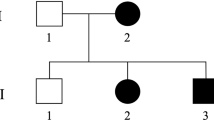Abstract
SPG8 is a rare autosomal dominant hereditary spastic paraplegia (AD-HSP), with only six SPG8 families described so far. Our purpose was to screen for KIAA0196 (SPG8) mutations in AD-HSP patients and to investigate their phenotype. Extensive family investigation was performed after positive KIAA0196 mutation analysis, which was part of an on-going mutation screening effort in AD-HSP patients. A novel pathogenic KIAA0196 mutation p.(Gly696Ala) was identified in two AD-HSP patients, who subsequently were shown to belong to a single large Dutch pedigree with more than 10 affected family members. The phenotype consisted of a pure HSP with ages at onset between 20 and 60 years, distally reduced vibration sense in the legs in all, and urinary urgency in seven out of 10 patients. Frequent features were exercise- or emotion-induced increase of spasticity and gait problems and chronic nonspecific lower back and joint pains. We have identified a fourth pathogenic KIAA0196 mutation in a Dutch HSP-family, the seventh family worldwide, with a less severe clinical course than described before.


Similar content being viewed by others
References
Schule R, Schols L (2011) Genetics of hereditary spastic paraplegias. Semin Neurol 31:484–493
Derivery E, Sousa C, Gautier JJ, Lombard B, Loew D, Gautreau A (2009) The Arp2/3 activator WASH controls the fission of endosomes through a large multiprotein complex. Dev Cell 17:712–723
Clemen CS, Tangavelou K, Strucksberg KH, Just S, Gaertner L, Regus-Leidig H, Stumpf M, Reimann J, Coras R, Morgan RO, Fernandez MP, Hofmann A, Muller S, Schoser B, Hanisch FG, Rottbauer W, Blumcke I, von Horsten S, Eichinger L, Schroder R (2010) Strumpellin is a novel valosin-containing protein binding partner linking hereditary spastic paraplegia to protein aggregation diseases. Brain 133:2920–2941
de Bot ST, Schelhaas HJ, Kamsteeg EJ, van de Warrenburg BP (2012) Hereditary spastic paraplegia caused by a mutation in the VCP gene. Brain 135:e223
Valdmanis PN, Meijer IA, Reynolds A, Lei A, MacLeod P, Schlesinger D, Zatz M, Reid E, Dion PA, Drapeau P, Rouleau GA (2007) Mutations in the KIAA0196 gene at the SPG8 locus cause hereditary spastic paraplegia. Am J Hum Genet 80:152–161
Kumar P, Henikoff S, Ng PC (2009) Predicting the effects of coding non-synonymous variants on protein function using the SIFT algorithm. Nat Protoc 4:1073–1081
Mathe E, Olivier M, Kato S, Ishioka C, Hainaut P, Tavtigian SV (2006) Computational approaches for predicting the biological effect of p53 missense mutations: a comparison of three sequence analysis based methods. Nucleic Acids Res 34:1317–1325
Venselaar H, Te Beek TA, Kuipers RK, Hekkelman ML, Vriend G (2010) Protein structure analysis of mutations causing inheritable diseases. An e-Science approach with life scientist friendly interfaces. BMC Bioinformatics 11:548
Moller P, Clark N, Maehle L (2011) A SImplified method for Segregation Analysis (SISA) to determine penetrance and expression of a genetic variant in a family. Hum Mutat 32:568–571
Hedera P, DiMauro S, Bonilla E, Wald J, Eldevik OP, Fink JK (1999) Phenotypic analysis of autosomal dominant hereditary spastic paraplegia linked to chromosome 8q. Neurology 53:44–50
Reid E, Dearlove AM, Whiteford ML, Rhodes M, Rubinsztein DC (1999) Autosomal dominant spastic paraplegia: refined SPG8 locus and additional genetic heterogeneity. Neurology 53:1844–1849
Rocco P, Vainzof M, Froehner SC, Peters MF, Marie SK, Passos-Bueno MR, Zatz M (2000) Brazilian family with pure autosomal dominant spastic paraplegia maps to 8q: analysis of muscle beta 1 syntrophin. Am J Med Genet 92:122–127
Acknowledgments
We would like to thank the patients for their participation in this study. This work was supported by the European Community’s Seventh Framework Program FP7/2007-2013 under grant agreement n° 223143 (project acronym: TECHGENE) to HS.
Conflicts of interest
SdB, SV, WB, AH, MV, AV and EJK report no disclosures. BvdW receives or has received research support from the Prinses Beatrix Fonds, the European Union, the Brain Foundation, Ipsen Pharmaceuticals, the Grossweiler Foundation, and the Royal Dutch Society for Physical Therapy. BK receives or has received research support from the University Medical Centre Groningen, and the BCN-Brain Research Institute. HS receives or has received research support from the European Union and the Netherlands Organization for Health Research and Development (ZONMW).
Ethical standard
This study has been approved by the appropriate ethics committee and has therefore been performed in accordance with the ethical standards laid down in the 1964 Declaration of Helsinki.
Author information
Authors and Affiliations
Corresponding author
Rights and permissions
About this article
Cite this article
de Bot, S.T., Vermeer, S., Buijsman, W. et al. Pure adult-onset Spastic Paraplegia caused by a novel mutation in the KIAA0196 (SPG8) gene. J Neurol 260, 1765–1769 (2013). https://doi.org/10.1007/s00415-013-6870-x
Received:
Revised:
Accepted:
Published:
Issue Date:
DOI: https://doi.org/10.1007/s00415-013-6870-x




